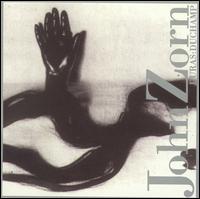| Duras: Duchamp | ||||
|---|---|---|---|---|
 | ||||
| Studio album by | ||||
| Released | August 19, 1997 | |||
| Recorded | April 1, 1997 at Shelley Palmer Studio, NYC May 1, 1997 at Avatar, NYC | |||
| Genre | Avant-garde, contemporary classical music | |||
| Length | 47:23 | |||
| Label | Tzadik TZ 7023 | |||
| Producer | John Zorn | |||
| John Zorn chronology | ||||
| ||||
Duras: Duchamp is an album of contemporary classical music by American composer and saxophonist/multi-instrumentalist John Zorn consisting two tribute compositions for Marguerite Duras and Marcel Duchamp. [1]
Contents
All tracks were recorded at Avatar on May 1, 1997. The only exception being track 5, which was at Shelly Palmer Studio a month to the day prior.